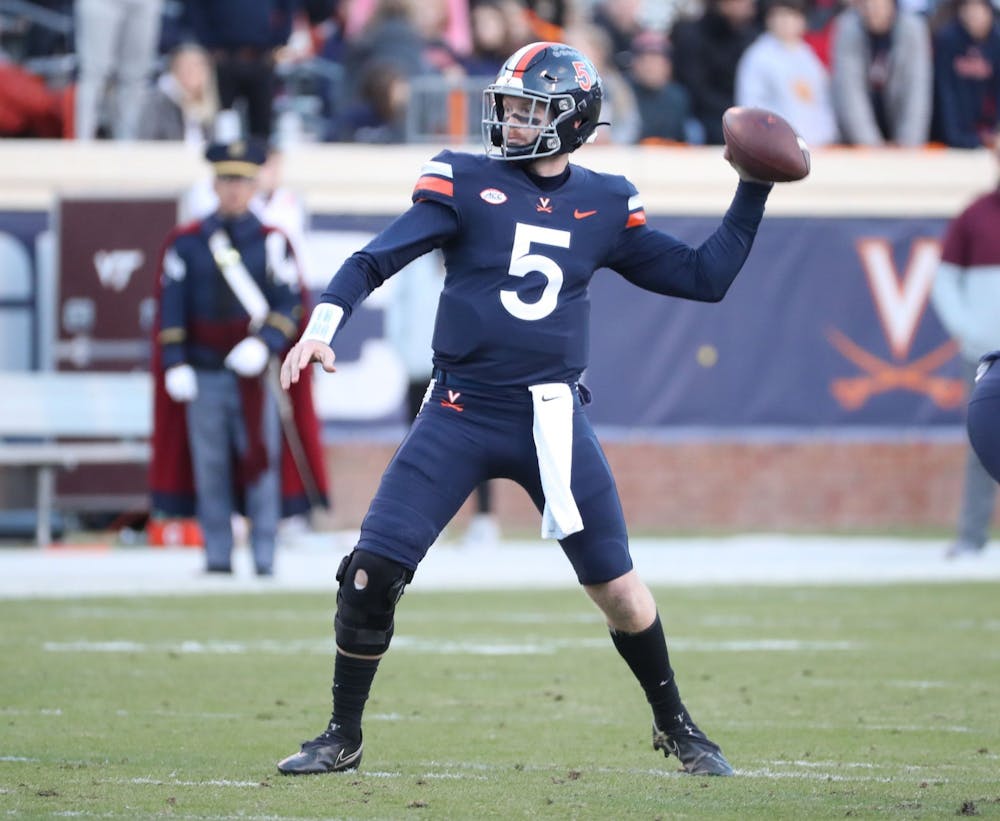Virginia football has had an up-and-down track record when it comes back to its quarterback position. Dating back to the 1990s, the Cavaliers enjoyed decent success with the likes of alumni Matt Blundin, Bobby Goodman, Mike Groh and Aaron Brooks. Most notable was Shawn Moore, who led the program to a No. 1 ranking in the AP Poll for three weeks in 1990, while also racking up a bevy of individual accomplishments that included a first team All-American selection and a fourth place vote in the Heisman race.
In the early 2000s, Matt Schaub — who arguably has the most successful NFL career out of any Virginia quarterback — continued to lead the program. However, after Schaub’s departure in 2003, Virginia struggled to find consistent play from their signal callers. In the 19 years leading up to 2003, Virginia had only two losing seasons. However, in the succeeding 13 years, the program suffered nine losing seasons, namely due to inconsistency at quarterback.
Arizona Western College transfer Bryce Perkins was exactly what Virginia needed. The eventual Virginia superstar arrived in Charlottesville in 2018 and immediately delivered the program’s first bowl win since 2005. In 2019, Perkins defeated Virginia Tech for the first time in 15 years, en route to appearances in the ACC Championship and Orange Bowl.
Perkins departed for the NFL after his historic 2019 campaign, and once again there was a big question mark at the quarterback position. Junior quarterback Brennan Armstrong — who was a redshirt freshman at the time — was the backup in 2019, making appearances in blowout games. Nonetheless, nobody really knew if he was the guy to keep Virginia on the pace it had established with Perkins.
The spread of COVID-19 right before the beginning of spring camp in 2020 amplified any potential concerns even more. A young quarterback who had never started a game in college was going to have to manage the transition to a starting role without a proper camp or practice. Armstrong’s ability to establish chemistry with his receivers, develop understanding of the playbook and experience game speed were all going to be hindered.
In the pandemic-shortened season, Armstrong led the team to a 5-5 record, which, considering the circumstances, was not all too bad. He flashed the potential, and displayed a dual threat ability reminiscent of his predecessor, Bryce Perkins. In 10 games, he threw for 2,117 yards, 18 touchdowns and 11 interceptions. Those numbers do not pop off the screen, but it is important to remember these were the first 10 starts of his college career. Still, there were questions about how much better he would perform with a full offseason.
Whatever concerns there were about Armstrong heading into 2021 were immediately discarded. The senior gunslinger posted arguably the greatest season out of any quarterback in Virginia history. He posted a passer rating of 156.4, good for third highest all-time among Virginia quarterbacks, only trailing Shawn Moore in 1990 and Matt Blundin in 1991. The Shelby, Ohio native missed a game due to injury and still posted 4,449 passing yards, the most in a single season at Virginia. With the Cavaliers’ running game being stagnant at points throughout the season, Armstrong’s arm was the main source of offense. In 11 games, he threw for under 300 yards just once, and over 400 yards six times, including a 554 yard performance against North Carolina.
Nobody is going to deny the fact that Armstrong had a spectacular season. If the Cavaliers’ defense did not have one of its worst seasons in program history, their 6-6 record would look a lot more realistic and reflective of Armstrong’s efforts.
When Virginia suffered defeat to Virginia Tech to conclude the 2021 season and former Coach Bronco Mendenhall retired, questions about the Cavaliers’ quarterback situation arose once again. Except this time, there was not any concern about who was going to be the next guy to step up. Rather, with new Coach Tony Elliott coming in from Clemson, the Virginia faithful had to consider whether their quarterback who posted an all-time great season would stick around with the new regime.
Ultimately, Armstrong decided to return to Virginia, which is huge for the program. Armstrong’s return does not just mean that the offense will continue to produce at a high level or that the Cavaliers will have a chance in the ACC Coastal again. It signals his commitment to Tony Elliott, and his belief in the new staff. For a squad that is replacing a lot of starters on both sides of the ball and a majority of the coaching staff, it would have been easy for Armstrong to transfer to a contender like a lot of other Virginia starters did. Yet, Armstrong decided to stick to his commitment to the Cavaliers, regardless of who was at the helm. That sends a message to the team and whoever Virginia pursues, that Tony Elliott is to be trusted to lead the team.
Virginia will have to be active in recruiting and the transfer market to return to the top of the ACC. They will have to fill holes on both sides of the ball, but with Armstrong calling the shots on offense, anything is possible. At the very least, Virginia does not have to worry about the quarterback carousel that has haunted them for so many years.






